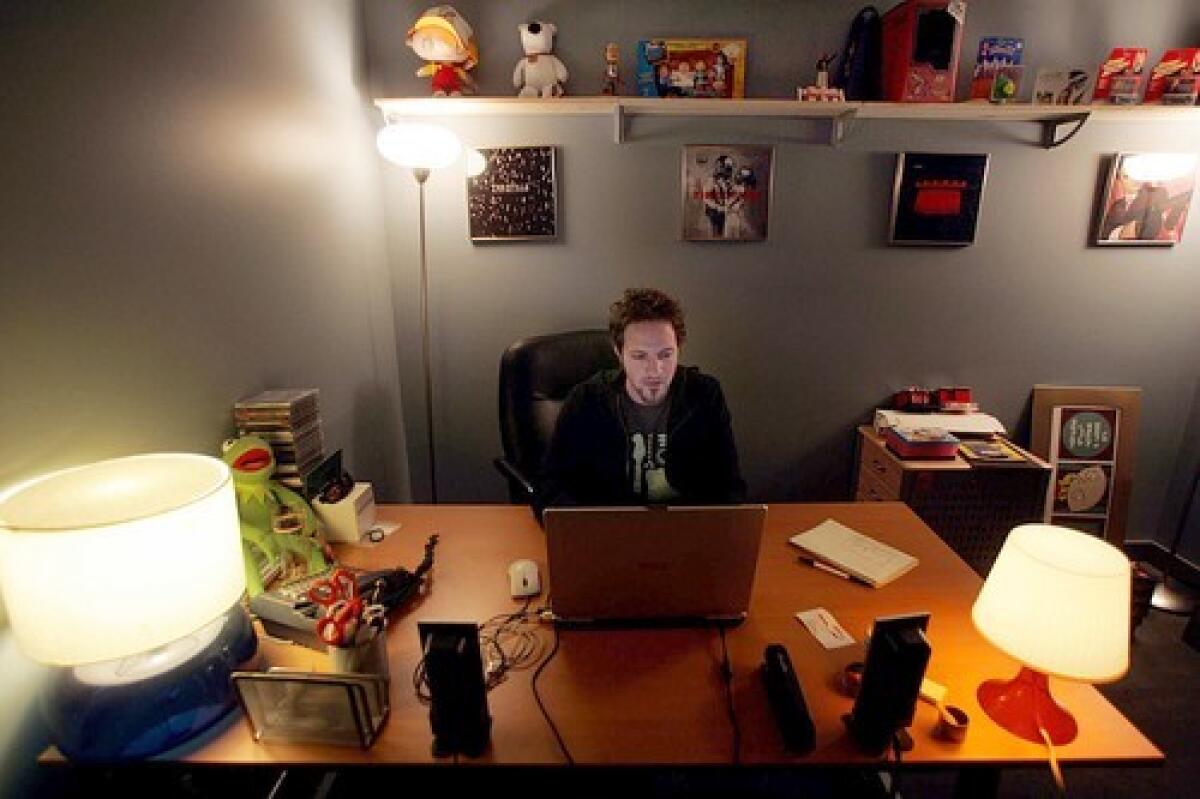Taking the Fans’ Word for It

When Dave Neupert founded the word-of-mouth marketing firm M80 in 1998, he had a tough time selling his idea to music and television executives.
His pitch was simple: For a fee, he would find superfans — people who already loved a company’s shows or musicians — and train them how to woo new consumers via the Internet.
Neupert’s idea ran counter to conventional “buzz marketing,” which reaches out to people who have lots of diverse friends — newspaper columnists, for example, or early adopters of new technologies — to spread the word.
Neupert believed that authentic enthusiasm would be more effective. So he set out to teach superfans how to sell. From a suite of offices tucked amid the hip eateries and boutiques of Silver Lake, he built armies of video game enthusiasts and television junkies. Then, he trained them to hype things they adored: the “Planet of the Apes” DVD, say, or a new album by musician Rob Zombie.
Neupert’s legions stood ready, at a moment’s notice, to attack Internet message boards with rave reviews of the television series “24” and send passionate e-mails deconstructing the history of Marvel superheroes. What’s more, those troops — volunteers all — did the work essentially for free, out of a love for the products they were pitching.
Today, Neupert’s superfan approach appears to be paying off. With 19 employees, M80 has grown as much as 20% a year since its founding and has annual revenue of about $2 million. The firm, which charges as much as $200,000 for a six-month campaign, is reportedly finalizing a deal to be acquired by one of the world’s largest advertising firms, WPP Group.
The company’s success is part of an explosion in the word-of-mouth industry, which one survey estimates will collect more than $200 million this year. But as word-of-mouth advertising becomes more mainstream, executives such as Neupert face new challenges.
M80 has built its success largely by promoting products that fans are eager to embrace, such as bands and television shows with cult followings. But as the company starts to advertise more everyday products, Neupert needs to find people who can get excited about toothpaste and toilet paper.
“Everyone is passionate about something,” Neupert said. “But we need to understand how to harness that enthusiasm.”
The idea that would become M80 came in 1996, when Neupert, then an executive at Maverick Records, was searching for a new way to promote the band Deftones. Neupert noticed that a website was filled with fan gripes about the group’s infrequent radio airplay. On a lark, he posted a suggestion: Why not start recruiting new listeners?
The response was immediate. Deftones fanatics began infiltrating Web groups to laud the band, and then reported back on which tactics were working. The band’s sales began to climb.
Two years later, Neupert quit Maverick to start his own firm. He called it M80, after the firecracker, and set up shop in his home, financing the start-up with personal savings.
“We started looking for the top 1% of fans,” Neupert said, explaining how he built teams of online volunteers for each campaign by finding people who were “already proactively searching for information about the band or TV show they loved.”
Then, M80 created Internet forums that contained information, clips and gossip, and primers on how to spread the word. Team members were given “missions,” such as persuading friends and strangers to post pictures of Rob Zombie on their Web pages or to deluge chat rooms with messages about forthcoming DVD releases. The most successful promoters were rewarded with T-shirts, CDs and sneak peeks of upcoming releases.
But more than getting freebies, Neupert said, his volunteers liked believing that their opinions mattered. In 2003, for example, M80 was hired by 20th Century Fox Home Entertainment to promote a forthcoming DVD of the recently canceled TV cartoon “The Family Guy.”
Neupert immediately discovered that “Family Guy” fans believed the program had been killed off too soon. That research, in part, led the Fox network to revive the cartoon.
“We’re trying to persuade fans to help us promote, and they’re trying to use us to talk to the shows’ producers,” Neupert said of the two-way street that is fan-based marketing.
Who are M80’s superfans? Kathleen Mayo of Austin, Texas, discovered the company when she was surfing the Internet to confirm rumors that one of her favorite television shows, the sci-fi epic “Highlander,” was about to come out on DVD.
Mayo, 32, had spent much of her life feeling socially uncomfortable. In high school, she said, “maybe 10 people out of 3,600 even knew my name. I was used to being ignored.”
But through M80, she discovered a community of other “Highlander” fans who were eager to teach her how to be outgoing enough to approach strangers online.
“M80 gave me a reason to put myself out there,” said Mayo, who estimated that she spent as many as 10 hours a week volunteering. “M80 team members taught me how to start a conversation. It’s been so important in helping me come out of my shell.”
Neupert says dedicated volunteers such as Mayo are the key to his company’s success. But he admits that Mayo has also disproved some of his theories about superfans.
After “Highlander” lured her to join, Mayo began signing up to promote TV shows she had never seen before, such as the FX Network’s war drama “Over There.” She found that expressing ignorance about the show has at times proved more persuasive than lauding her expertise. Apparently, uninformed opinions seemed more genuine, and less like polished promotions.
“I find that when I say, ‘I don’t know what this TV show is about,’ other people start saying, ‘Well, let’s figure it out together,’ ” she said.
Being an effective word-of-mouth campaigner, it turns out, may have less to do with one’s enthusiasm for the product and more to do with how much one enjoys campaigning.
“You can’t fake passion,” Neupert said. “As long as we have team members who want to enthusiastically share their opinions, they’ll convince others to try something new.”






